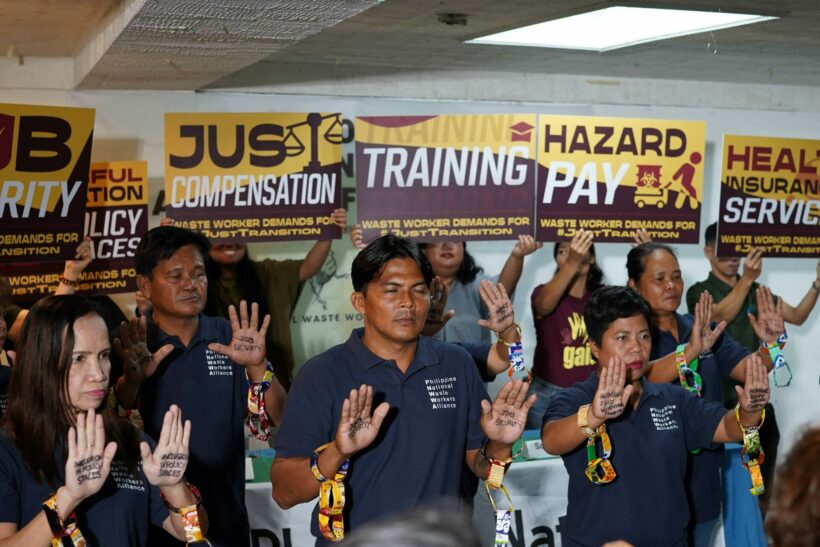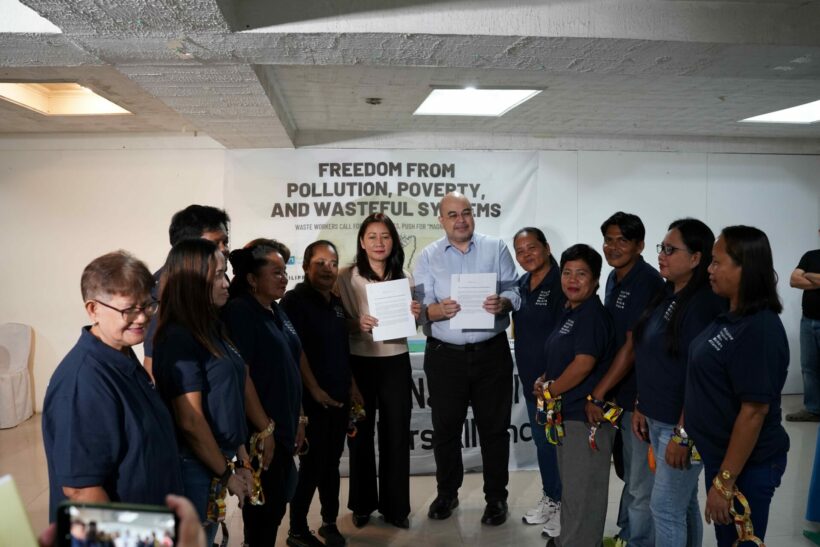Waste Workers Call For Equal Rights, Push for “Magna Carta”
Quezon City, Philippines – As the Philippines approaches its 126th year of independence, the newly established Philippine National Waste Workers Alliance (PNWWA) urges lawmakers to enact a Magna Carta for Waste Workers to secure vital legislative protection. This significant move seeks to recognize the indispensable work of waste workers and waste pickers and, address the social and economic challenges they face daily.
Formed in February 2024, PNWWA is a coalition of 12 waste worker organizations representing over a thousand members across the archipelago. Their unified voice underscores the need for legislative action to improve the working conditions and safeguard the rights of waste workers and waste pickers nationwide.
“We are calling for, among others, just compensation and social benefits and protection because we provide essential services to society. We are as deserving of such benefits and protection as any other worker, perhaps even more so. Without us, society will not function efficiently,” said Aloja Santos, Dumaguete Women Waste Workers Association (DWWWA) president and PNWWA founding president.
In February, during a national consultation with waste workers organized by Mother Earth Foundation (MEF) with the support of the Global Alliance for Incinerator Alternatives (GAIA) Asia Pacific, which resulted in the establishment of PNWWA, participants formulated 10 priority demands that must be reflected in a draft Magna Carta. These demands were shaped by extensive consultations with waste workers conducted by MEF over the years.

The demands are:
-
Enforcement of Labor Standards (Pagpapatupad ng mga Pamantayan ng Paggawa)
-
Hazard Pay (Bayad sa Panganib)
-
Health Insurance and Services (Seguro at Serbisyong Pangkalusugan)
-
Humane and Safe Working Conditions (Makatao at Ligtas na Kalagayan sa Pagtatrabaho)
-
Job Security (Seguridad sa Trabaho)
-
Just Compensation (Tamang Pasahod)
-
Meaningful Participation in Policy Spaces (Makabuluhang Pakikilahok sa mga Usaping Pampolisiya)
-
Right to Organize (Karapatang Mag-organisa)
-
Social Benefits and Protection (Kapakinabangan at Proteksyong Panlipunan)
-
Training (Pagsasanay)
Following the consultation, a Magna Carta for Waste Workers was drafted and PNWWA presented it to Senator Loren Legarda. As the author and principal sponsor of the Ecological Solid Waste Management Act, Senator Legarda with her legal team immediately studied the proposed legislation and filed the bill on April 17, 2024, which is now pending in the Committee on Labor, Employment and Human Resources Development.
“I acknowledge the validity of the demands of the waste workers — their call for fair treatment, job security, and access to essential services resonates deeply with the principles of justice and equity. These are valid concerns that warrant attention and action, and I am committed to working collaboratively in finding solutions that ensure a just transition for all,” Senator Legarda said.
Atty. Christopher John C. Menguito, Managing Trustee of the Philippine Earth Justice Center explained the importance of integrating these solutions into the law through magna carta as he said, “The purpose of the law is to make the lives of the people better.”
As the world faces multiple environmental crises and ecological collapse, the contribution of waste workers and waste pickers as frontliners in combating waste pollution is needed now more than ever. Data reveals that methane, a potent greenhouse gas, accounts for about 30% of the rise in global temperature since pre-industrial times, and in 2021, anthropogenic waste is among the major sources of methane emissions. In Metro Manila alone, waste generation contributes 22.2%, 24.5%, and 26.7% to the Philippines’ solid waste in 2010, 2014 and 2020, respectively. This underscores the power waste workers wield towards ensuring a sustainable and waste-free future. From composting to diverting reusable materials away from landfills, they play a vital part in waste management and recycling, offering practical and cost-effective solutions to address both waste and climate issues.
“This moment underscores the importance of recognizing waste workers and waste pickers as frontline environmental defenders. We must prioritize their rights and ensure they have full labor protections under the law. This commitment sets the foundation for collaborative advocacy, fostering a truly inclusive and just transition, said Sonia Mendoza, Chair of Mother Earth Foundation.
“The Magna Carta for Waste Workers is a powerful tool in fostering significant change not only in the Philippines but for the whole Southeast Asian region. Waste workers and waste pickers are claiming their rights, making their voices heard and their presence felt. Their desire and determination to be part of the process are crucial in the shift towards a sustainable waste management system. Together, we are forging a future where we do not leave anyone behind,” Froilan Grate, Regional Coordinator of the Global Alliance for Incinerator Alternatives (GAIA) Asia Pacific, emphasized.
Additional quotes below:
From the Members of the Philippine National Waste Workers Alliance (PNWWA)
The members of the PNWWA shared their clarion call during the Press Conference for the Magna Carta of Waste Workers, acting for their independence, as they cried in unison “Kalayaan mula sa polusyon, kahirapan, at basurang sistema! Itaguyod ang pantay na karapatan para sa manggagawa sa basura! (Freedom from pollution, poverty, and wasteful systems! Uphold equal rights for waste workers!)” The call came as waste workers aim to break free from the cycle of poverty and take charge of their dignity and rights.
From the EcoWaste Coalition
While the EPR law holds promise for including waste workers, especially the informal waste sector by integrating them into formal waste management systems by encouraging their participation in the ‘product waste recovery programs aimed at effectively preventing waste from leaking to the environment’ as stated in Sec. 6, Article 1 B.6 of the law, its success depends on the proper implementation by the different stakeholders.
We encourage obliged enterprises or large enterprises and LGUs implementing the EPR Law to include the waste workers organization, in the following:
1. Under Section 4, composition of the National Solid Waste Management Commission
2. Under Section 6 Article 2.B: in the creation of Producer Responsibility Organizations by the obliged enterprises.
The EPR Law should align with RA 9003 and the National Framework Plan for the Informal Waste Sector that fully integrates the waste workers to safeguard their rights and well-being.
Efforts made by duty bearers and obliged enterprises should support the inclusion of waste workers at all levels of decision-making: from the Barangay Ecological Solid Waste Management Committee up to the National Solid Waste Management Commission. They must ensure inclusivity, collaboration, and fair compensation for the waste workers that are reflective of their responsibilities, skills, and the hazardous nature of their work, accompanied by comprehensive benefits that prioritize their health and safety.
From Secretary, Maria Antonia Yulo-Loyzaga, Department of Environment and Natural Resources (DENR)
In the global response to climate change and environmental pollution, the green transition will have gainers and losers with new (green) jobs being created and other jobs being lost. For the informal waste sector, this presents an opportunity to enhance worker agility and competitiveness to undertake new occupations and respond to the changing nature of jobs towards a circular economy, just transition, and resilience for the future of work.
The Department of Environment and Natural Resources (DENR) recognizes the significant contribution of workers in the informal waste sector in delivering better environmental outcomes. As we strengthen the implementation of the Ecological Solid Waste Management Act and the Extended Producer Responsibility (EPR) Act, we make sure that we do not leave the waste workers behind. We aim to integrate the informal waste sector into the value chain, including transforming the collection and sorting of waste into formal activities and enterprises that are supported under the EPR system. We advocate for the reskilling and upskilling of waste workers so they can benefit in the transition to a low-carbon economy.
We welcome the Magna Carta of Waste Workers bill since DENR supports the formalization of waste workers’ rights and benefits, and the professionalization of the sector. The inclusion of the waste sector in the enforcement of labor laws, and the creation of supporting policies that are responsive to the needs of waste workers are key to enhancing their socioeconomic well-being allowing them to benefit and contribute better to our shared goals. By supporting this bill, we make them partners in sustainable development in our commitment to a just, inclusive, and resilient future for all.
From Mayor Vilma B. Caluag, City of San Fernando, Pampanga
The City Government of San Fernando, Pampanga, under our leadership, is supporting—with complete pride—the creation and submission of the Magna Carta of Philippine Waste Workers, spearheaded by the Philippine National Waste Workers’ Association (PNWWA) and various non-government organizations.
Our support for PNWWA strongly speaks to our drive to help our waste workers move and fight for their rights, and this is anchored on our call for inclusivity and protection across all sectors.
In our local government unit, we make sure that our waste workers, from our garbage collectors down to our segregators, get their rights, including the provision of personal protective gear, just compensation and benefits, health and wellness programs, and fair treatment, along with various privileges such as additional allowances and recreational activities.
These actions were made possible out of our belief that no one should be left behind, and with the help of the NGO partners of our City Environment and Natural Resources Office across Asia Pacific, we hope that these practices may also inspire other localities to take a move towards the protection of waste workers.
The City of San Fernando is extending its utmost gratitude to the people and groups behind this movement, and rest assured that we are one with you in this measure heading to the realization of labor rights and environmental justice and protection.
In fighting for our waste workers’ dignity and rights, Kayabe yu kami.
Discover more about our waste pickers and waste workers and their advocacy towards a just transition.
PHOTOS and VIDEOS here.
——————————————————————————————————————-———
PHILIPPINE NATIONAL WASTE WORKERS ALLIANCE (PNWWA) is an alliance composed of 12 waste workers groups representing over a thousand waste workers across the Philippines. Established in February 2024, the Alliance is working for the recognition and protection of their rights and welfare.
MOTHER EARTH FOUNDATION PH is a non-stock, non-profit organization actively engaged in addressing waste and toxic pollution, climate change, and other health and environmental justice issues. It is best known for its advocacy of Zero Waste through the systematic reduction and proper management of waste.
GLOBAL ALLIANCE FOR INCINERATOR ALTERNATIVES (GAIA) is a network of grassroots groups as well as national and regional alliances representing more than 1,000 organizations from 92 countries. With our work, we aim to catalyze a global shift towards environmental justice by strengthening grassroots social movements that advance solutions to waste and pollution. Through our members, we support waste picker and waste worker groups in implementing Zero Waste solutions, and in their fight for a just transition towards a Zero Waste future.
PHILIPPINE EARTH JUSTICE CENTER (PEJC) is a group of environmental lawyers advocating for environmental justice and a balanced ecology through legal assistance, policy research, policy reforms, and strengthening the capabilities of local communities.
ECOWASTE COALITION is a network of more than 150 groups advocating for a Zero Waste society in the Philippines. They aim to address issues related to waste, climate, and chemicals through research, information dissemination, training, and advocacy.






